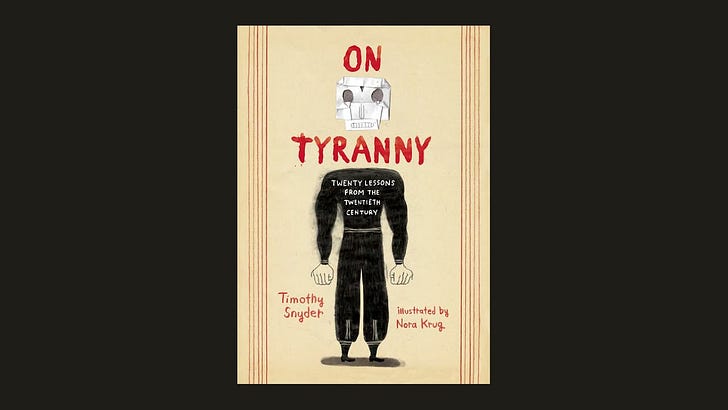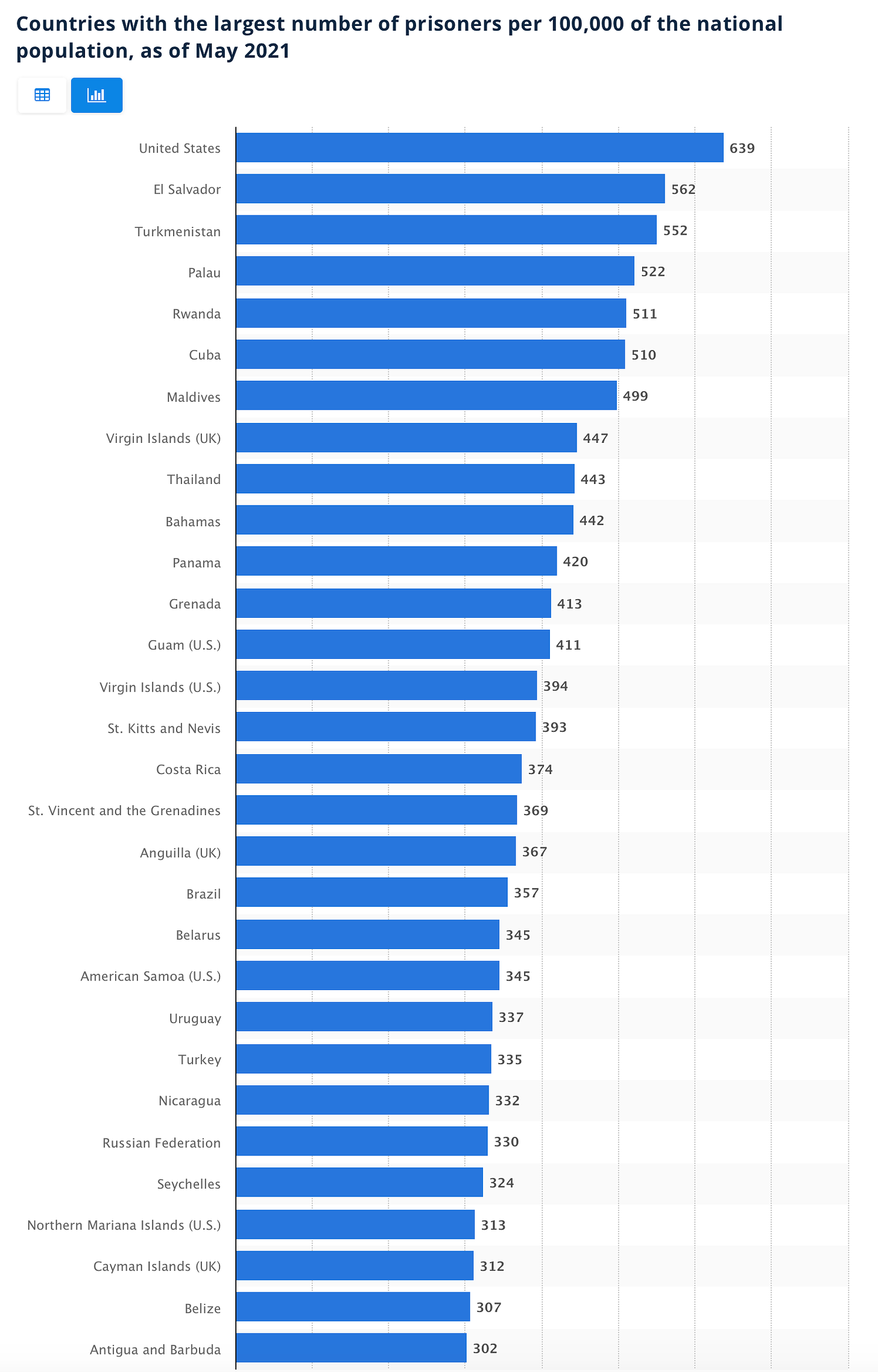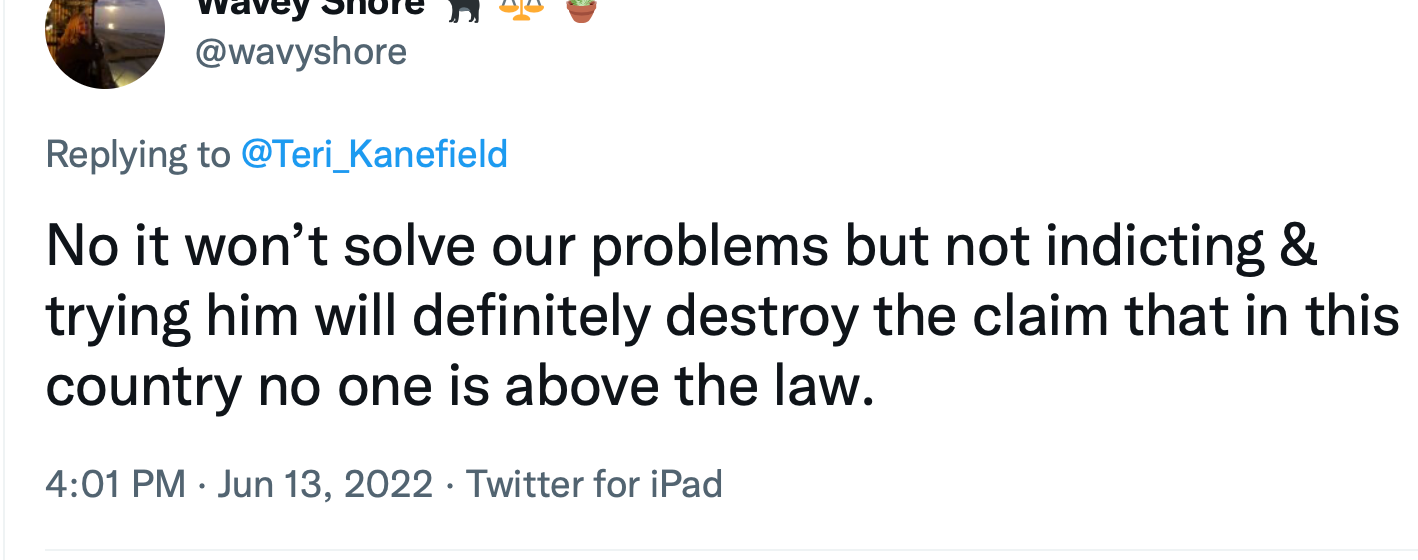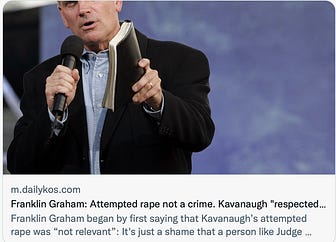There is a school of thought out there that believes Republicans are cool with lawbreaking and insurrections because there are not enough consequences:
If you ask a Republican why they are cool with insurrectionists and law breakers, they will tell you that Democrats do it, too.
They look at the insurrection and say, ‘But what about all those cities burning last summer during the George Floyd protests?”
Either (1) they genuinely think these two things are equivalent or (2) they know better and they are engaging in a Soviet technique called “whataboutism.”
When researching my book on disinformation, I found a joke that circulated under Stalin, which goes like this:
Western diplomat: Soviet labor camps are an abomination and human rights disaster.
Stalin: But what about lynchings in the American South?
“Whataboutism,” short-circuits a discussion, deflects blame, and throws people off balance.
“Trump is a crook!”
“But what about Hunter Biden?”
The thing about propaganda techniques is that they work. It’s super easy to say, “What about Hunter Biden?”
It takes a lot of work to refute the point and explain that it’s a false equivalence. When you have to talk that much to explain, you lose the propaganda war.
“He also does it” is never a moral justification for wrongdoing. It comes from a cynical worldview that goes like this: Everyone lies and cheats, so the person who lies and cheats the best wins.
They look at Trump and say, “He’s a liar, but he’s our liar.”
They look at the insurrectionists and say, “These are our warriors; the liberals have their own warriors called Antifa.”
If you think everyone lies and cheats, the goal is to get really good at lying and cheating.
Cynics don’t believe that any leaders actually care about the best interests of their constituents because they think everyone is a self-interested, lying crook. A cynic doesn’t think there is any other reason for trying to gain power.
REPUBLICAN LAWBREAKING
The Republicans knew when they nominated and voted for Donald Trump for president, that he had a history of breaking and bending laws.
That’s why many of them liked him. He was tough! He promised to blast through the rules and get things done! “He’s a fighter, but he’s our fighter.”
Michael Sherer, writing for the New York Times in 2018, noted that “Lawbreaking is becoming a Republican badge of honor.”
My list from yesterday’s post:
- Trump Organization (indicted for fraud)
- Steve Bannon
- Peter Navarro
- Michael Flynn
- Allen Weisselberg (Trump Org CFO)
- George Papadopoulos
- Rick Gates
- Lev Parnas
- George Nader
- Paul Manaford was convicted and spent time in jail, as did Michael Cohen.
Okay, so: Why do Republicans Break Laws (and protect and cheer lawbreakers)?
Republicans Break the laws they don’t like
First, some history for perspective.
Nineteenth-century American society was a patriarchy: a social hierarchy with White men at the top and Black women at the bottom.
Laws reflect cultural values. As the culture changes, laws change. Laws in the 19th century reinforced the patriarchy.
Example: A court in North Carolina in 1868 refused to convict a man for beating his wife because the wounds he inflicted were not serious. (61 N.C. 453.) The court said that unless severe injury resulted, it wasn’t the business of the courts or the government to interfere in family life. The idea was that a man was entitled to rule his family as he saw fit.
Laws allowed for racial segregation.
Laws outlawing abortion and making birth control difficult also reinforced the patriarchy by keeping women dependent on men.
Rape laws traditionally reinforced the patriarchy: For much of world history, rape was a property crime. An unmarried girl was her father’s property. A married woman was her husband’s property. If a virgin was raped, the property damage was to her father. If she was married, the damage was to her husband.
If she wasn’t a virgin and wasn’t married, there was no crime (because the property was already damaged). A man couldn’t rape his wife (his own property) and rape of enslaved women wasn’t a crime.
Sexual assault (meaning the act wasn’t completed) wasn’t a crime because there was no actual property damage.
Rapes were evaluated within the context of the hierarchy. A powerful White man accused of rape was of course treated differently from a Black man. It also mattered who was raped. The laws were designed to protect [White] men from false accusations. They weren’t designed to protect women from attack.
The way we’ve been getting out of the patriarchy is by changing the laws governing things like racial discrimination and the legal status of women (which includes rape laws and access to abortion).
The laws put in place since the New Deal and Civil Rights movement are dismantling the patriarchy. These are the laws that Republicans hate. The regulatory agencies that create and enforce these regulations are what they call the Deep State.
In 2018, Trump said: “All our laws are so corrupt and stupid” What he meant, of course, was that he doesn’t like the laws that get in his way.
Another theory of Republican lawbreaking is that, back when the frontier was open, there was a place lawbreakers could go. People who didn’t like to live by society’s rules had a place to go.
Now there is no more frontier, so such people are stuck with the rest of us.
Republicans Are Shielding the Insurrectionists Because Republicans, too, Are Anti-Federal Government
We have a long history in this country of a sizable group of Americans being anti-federal government.
The Confederacy was anti-federal government because they knew that the federal government, if given the chance, would abolish slavery.
Segregationalists were anti-federal government because they knew the federal government would outlaw segregation. (And in fact, it was the federal government that ended racial segregation.)
The federal government gave us the Civil Rights Act (1964) and the Voting Rights Act (1965) which helped enable members of minority communities to vote and move into positions of power.
People who want to get rich by cheating want to dismantle the regulatory agencies of the federal government so they can cheat the way they did in the 19th century.
Yesterday I quoted from the Patriot Front white supremacy militia’s manifestos:
“The time of the Republic has passed in America as the system grows too weak to perform its duty. … The damage done to this nation and its people will not be fixed if every issue requires the approval and blessing from the dysfunctional American democratic system. Democracy has failed in this once great nation.”
— Patriot Front manifesto.
“The American Identity was something uniquely forged in the struggle that our ancestors waged to survive in this new continent. … To be an American is to realize this identity and take up the national struggle upon one’s shoulders. Not simply by birth is one granted this title but by the degree to which he works and fulfills the potential of his birth.”
— Patriot Front manifesto.
“An African, for example, may have lived, worked, and even been classed as a citizen in America for centuries, yet he is not American. He is, as he likely prefers to be labeled, an African in America. The same rule applies to others who are not of the founding stock of our people as well as to those who do not share the common unconscious that permeates throughout our greater civilization, and the European diaspora.”
— Patriot Front manifesto.
Such people want to destroy the federal government because of a “crisis of legitimacy” which happens when people don’t think the government governs on their behalf. See: “The Authentic Appeal of the Lying Demagogue.”
They think the “political establishment” is favoring new groups over “real” Americans. Exactly what Laura Ingraham explained here when she said:
If you want to dismantle the federal government, you can do it slowly or you can bring in a wrecking ball.
Trump was a wrecking ball. These guys are wrecking balls:
Republicans have to defend insurrectionists because these are their voters. Without their votes, they cannot achieve electoral majorities.
The Limits of Deterrence
People who have no experience with the criminal justice system often have the idea that punishment deters crime.
To be clear, I am not arguing against indicting or prosecuting Trump and his co-conspirators.
I am trying to dispel the idea that (1) doing so will stop right-wing extremists from committing crimes and (2) the reason they commit crimes now is because punishment hasn’t been harsh enough.
The idea that harsh punishment can deter crimes led us to harsher and harsher punishments in the 1980s and 1990s, which gave us our current prison system.
Did you know the United States has the highest per capita prison rate in the world?
This is after our prison population fell to the lowest level since 1995. Put simply, Americans are in love with prisons.
What we’ve learned from building the world’s largest prison system is that harsh punishment doesn’t deter crime. The National Institute of Justice (the research, development, and evaluation agency of the U.S. Department of Justice) has concluded that “sending an individual convicted of a crime to prison isn’t a very effective way to deter crime” and “increasing the severity of punishment does little to deter crime.”
There is a lot more research out there on that.
The theory of deterrence assumes that a person knows what the criminal consequences of particular actions are (most people don’t).
The theory of deterrence also assumes that the person about to commit a crime is capable of rational thought and rational analysis. Many are not.
The theory of deterrence assumes that people who are imprisoned will “learn their lessons” and stop committing crimes.
This is easily disproven by recidivism rates. The United States has some of the highest recidivism rates in the world. According to the National Institute of Justice, almost 44% of criminals released return before the first year out of prison. In 2005, a whopping 68% of 405,000 released prisoners were arrested for a new crime within three years, and 77% were arrested within five years.
People often emerge from prison hardened, radicalized, and inclined to commit crimes than before they were imprisoned.
Even the jailed insurrectionists are hardening. A judge recently found that “toxic” conditions in the D.C. jail were leading to further radicalization of the insurrectionists. It was reported, for example, that the Jan. 6 defendants have started their own jail newsletter.
I haven’t read the jailhouse newsletter, but I suspect that it is not about how they all need to learn to love liberal democracy and multiculturalism.
Another example: In October 2021 after more than 600 insurrectionists were charged or sentenced, a Trump supporter said this:
Hundreds and hundreds of indictments didn’t deter that guy from wanting to use his guns to control elections.
Imagine how these guys will react when they are told Trump is being prosecuted by a government they believe is illegitimate.
Moreover, crimes often happen in prison, and these are often brutal crimes.
Incapacitation (the theory that if you imprison people they can’t commit crimes) is flawed because you can’t keep people inclined to commit crimes in jail, or you’ll have a situation of lifetime imprisonments for repeat shoplifters.
See the problem with that?
If you don’t see a problem with that, consider this: How can you determine whether a person might, in the future, commit a crime? It’s not possible to imprison people who might in the future commit crimes and offer due process to all people. How would such imprisonments not become selective? How would it not be abused and fall more heavily on vulnerable communities?
People were frustrated by some of the “light” sentences going to some of the insurrectionists, but judges follow the sentencing guidelines: if the person merely trespassed, or trespassed and damaged property, they don’t get long sentences.
Paradoxically, deterrence does work on rational and law-abiding people. Story: One day my husband realized he’d gotten on the light rail but forgot his ticket. He was nervous until he could get off the train and purchase one. He was terrified of the embarrassment of being asked for a ticket and not having one.
Average people who are indicted for crimes can go broke defending themselves and may never recover from the stigma. Many will lose their jobs as their cases are pending.
On the other hand, if (or when) Trump is indicted, he will claim that he is being persecuted for his political beliefs by his political enemies. It’s possible (even likely) that he will use the indictment to raise millions of dollars from his supporters.
Wealthy people can survive a stint in jail, and even longer sentences. They come out with their mansions waiting for them. Average or low-income working people have their lives completely wrecked. They often come put destitute with no choice but to commit crimes because people who have committed felonies often can’t get work.
Trump, on the other hand, may end up richer.
Convicting and imprisoning a political leader can have a positive impact — depending upon how it is done.
If the prosecution appears politically motivated (or worse, it is politically motivated) it can cause more harm and stir people to more anger.
This is why, as I argued here, and here, and here, it is important for the DOJ to conduct a thorough inquiry that is not (and does not appear) partisan.
Sometimes convicting and imprisoning a political leader does nothing: Hitler was jailed, and while in prison, wrote Mien Kampf, and we all know what happened when he finished serving his term.
Sometimes imprisoning a political leader can give a movement momentum. Rosa Parks was arrested. Martin Luther King, Jr., Mohandas (Mahatma) Gandhi, and Nelson Mandela were imprisoned.
Imprisoning Trump may not have the effect people assume that it will have.
This is not to say he should not be indicted and (if convicted) imprisoned.
I am arguing (1) It will not solve our political problems, (2) it must be done right, and (3) if it is not done right, it could make our political problems worse.
[By the way, what you learn to do in law school is break everything into elements: (1) like this, and (2) this.]
People say “well at least if he’s imprisoned we can heal! At least we can feel that there is justice and rule of law! At least our confidence will be restored!”
Um, be warned. Trials can be harrowing. Judges make rulings you don’t like. The jurors may have you worried, perhaps for good reason. Evidence will be excluded for various reasons. That’s just how it goes.
That’s why it’s so important that the Select Committee can make this presentation outside the context of a criminal trial.
If (or when) Trump is indicted, I can predict this based on what I’ve seen over the past 5 years on social media: The people now demanding an indictment will be the people shouting that “the system is a failure” each time the judge makes a ruling they don’t like.
Imagine how people will feel if an investigation is rushed and Trump is acquitted.
WHY THIS IS IMPORTANT

























Jun 15
There have been tons of consequences as we’ve watched this all play out, and there will be more as move forward. Still, even if complete justice is eventually served with respect to the insurrection, isn’t the biggest reason that indicting and convicting Trump won’t solve the problem on its own because he is merely a symptom of a much larger ideological divide that led to the insurrection in the first place? Even so, there is merit to everyone being judged by the same set of rules, not as a deterrent, but in order for a lawful society to function well despite some people trying their darnedest to corrupt that system.
With respect to the Select Committee, the most important thing there is for them to make public the complete story of what happened and how it happened. We have no hope of even starting to address our problems if we do not have a common understanding of the truth, no matter what happens on the justice side of the equation which as you’ve said isn’t part of the Select Committee’s purview.
1ReplyCollapse
Jun 16
“…the criminal justice system cannot solve political problems.”
In 1982 the DNC filed a civil lawsuit against the RNC for illegal harassment and voter intimidation conducted during the 1981 election by the RNC’s “National Ballot Security Task Force”. The RNC and New Jersey Republican State Committee agreed to a consent decree in 1982 which barred Republicans from engaging in any further such conduct. For the next 40 years, until the 2020 election, this consent decree hung over the Republican party and restrained it from illegal voter harassment and intimidation activities. On January 8th 2018, Judge John Vasquez ruled that the decree had expired.
The criminal justice system CAN solve political problems if the right criminal – in this case the Republican party – is charged with the crime.
https://en.wikipedia.org/wiki/Ballot_Security_Task_Force
ReplyCollapse